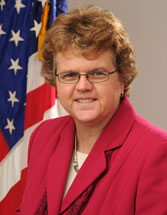Money for the federal programs that millions of seniors rely on to live independently in their own homes will not rise with the growing demand, Kathy Greenlee, head of the Administration on Aging, told members of the Gerontological Society of America during its annual meeting. More than 3,800 researchers, scientists, educators and health professionals specializing in aging and elder care attended the five-day conference that concludes Tuesday.

Kathy Greenlee
Greenlee’s agency is part of the Department of Health and Human Services and administers the Older Americans Act, providing funding for home-delivered and group meals, adult day care, caregiver support, transportation, home modification, help with chores, in-home assistance, and other services.
“If my budget remains flat, I will consider that a success,” said Greenlee, assistant secretary for aging.
More than 8,000 people a day turn 65 as the baby boomer generation ages.
Since the Older Americans Act was enacted in 1965, it has served a shrinking percentage of the senior population, primarily those older and more frail seniors who tend to live in rural areas, Greenlee said. The law is due to be reauthorized by Congress this year and the Obama administration had requested an overall 12 percent increase in funds.
That was before the failure of the so-called super committee to reach a budget compromise, which triggers across-the-board cuts in federal spending scheduled to take effect in 2013.
Also in her remarks yesterday, Greenlee asked conference attendees for help in providing the research to demonstrate whether programs for seniors are “evidence based” and produce positive results.
In what Greenlee called a “policy shift,” the agency is recommending that Older American Act money for exercise and other state health promotion efforts be limited only to programs that have shown to be effective in keeping seniors healthy.